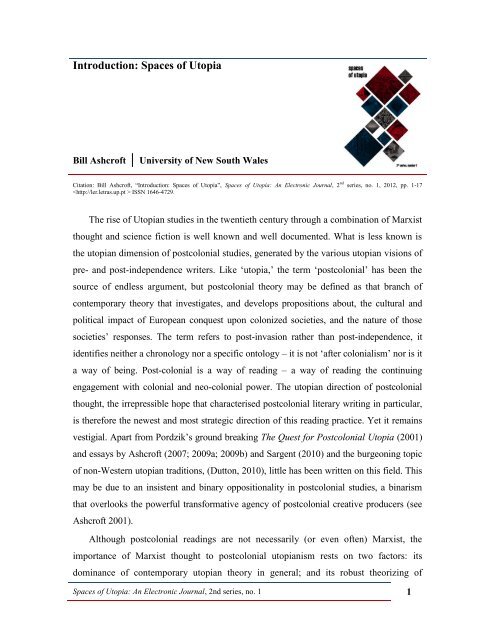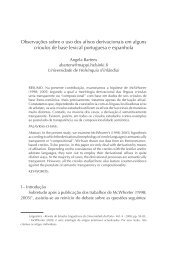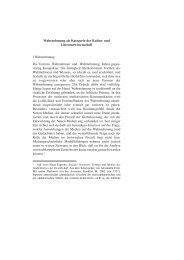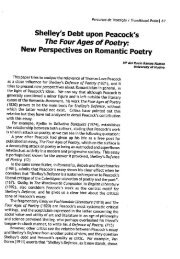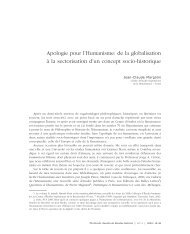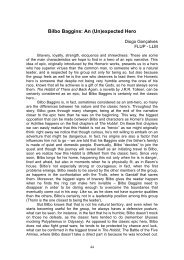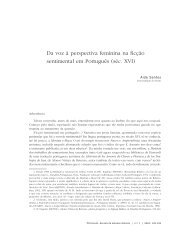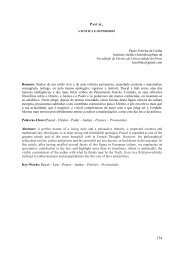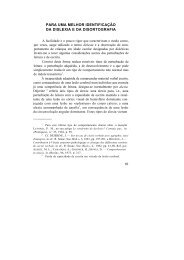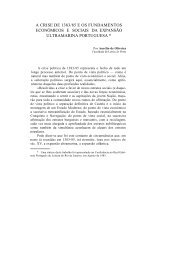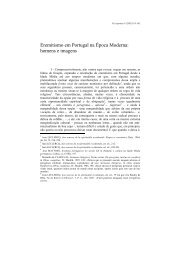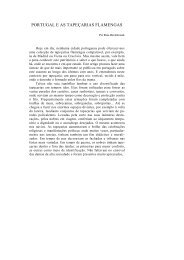File (.pdf)
File (.pdf)
File (.pdf)
Create successful ePaper yourself
Turn your PDF publications into a flip-book with our unique Google optimized e-Paper software.
Introduction: Spaces of Utopia<br />
Bill Ashcroft │ University of New South Wales<br />
Citation: Bill Ashcroft, “Introduction: Spaces of Utopia”, Spaces of Utopia: An Electronic Journal, 2 nd series, no. 1, 2012, pp. 1-17<br />
ISSN 1646-4729.<br />
The rise of Utopian studies in the twentieth century through a combination of Marxist<br />
thought and science fiction is well known and well documented. What is less known is<br />
the utopian dimension of postcolonial studies, generated by the various utopian visions of<br />
pre- and post-independence writers. Like ‘utopia,’ the term ‘postcolonial’ has been the<br />
source of endless argument, but postcolonial theory may be defined as that branch of<br />
contemporary theory that investigates, and develops propositions about, the cultural and<br />
political impact of European conquest upon colonized societies, and the nature of those<br />
societies’ responses. The term refers to post-invasion rather than post-independence, it<br />
identifies neither a chronology nor a specific ontology – it is not ‘after colonialism’ nor is it<br />
a way of being. Post-colonial is a way of reading – a way of reading the continuing<br />
engagement with colonial and neo-colonial power. The utopian direction of postcolonial<br />
thought, the irrepressible hope that characterised postcolonial literary writing in particular,<br />
is therefore the newest and most strategic direction of this reading practice. Yet it remains<br />
vestigial. Apart from Pordzik’s ground breaking The Quest for Postcolonial Utopia (2001)<br />
and essays by Ashcroft (2007; 2009a; 2009b) and Sargent (2010) and the burgeoning topic<br />
of non-Western utopian traditions, (Dutton, 2010), little has been written on this field. This<br />
may be due to an insistent and binary oppositionality in postcolonial studies, a binarism<br />
that overlooks the powerful transformative agency of postcolonial creative producers (see<br />
Ashcroft 2001).<br />
Although postcolonial readings are not necessarily (or even often) Marxist, the<br />
importance of Marxist thought to postcolonial utopianism rests on two factors: its<br />
dominance of contemporary utopian theory in general; and its robust theorizing of<br />
Spaces of Utopia: An Electronic Journal, 2nd series, no. 1 1
utopian thought apart from any teleological vision of utopia. The influence of Marxism is<br />
also well documented in anti-colonial discourse where the idea of political utopia has<br />
long been acknowledged in decolonization rhetoric. The pre-independence utopias of<br />
soon to be liberated postcolonial nations provided a very clear focus for anti-colonial<br />
activism in British and other colonies. But this appeared to come to an abrupt halt once<br />
the goal of that activism was reached and the sombre realities of post-independence<br />
political life began to be felt. The postcolonial nation, a once glorious utopian idea, was<br />
now replaced in the literature, particularly in Africa, by a critical rhetoric that often<br />
landed authors in gaol. But gradually, for instance in Africa through writers such as Ayi<br />
Kwei Armah, Ngugi wa Thiong or Ben Okri, and latterly women writers such as<br />
Chimamanda Adiche, Sade Adeniran and Unomah Azuah, post-independence despair has<br />
been giving way to broader constructions of future hope.<br />
For postcolonial utopianism, as for most contemporary utopian theory, Utopia is no<br />
longer a place but the spirit of hope itself, the essence of desire for a better world. The<br />
space of utopia has become the space of social dreaming (Sargent, 2000: 8). For Fredric<br />
Jameson ‘practical thinking’ everywhere represents a capitulation to the system. “The<br />
Utopian idea, on the contrary, keeps alive the possibility of a world qualitatively distinct<br />
from this one and takes the form of a stubborn negation of all that is” (Jameson, 1971:<br />
110-11). Postcolonial literatures forcefully extend this transformation beyond Thomas<br />
More’s Utopia: any economic dimension in the myth of Aztlan in Chicano culture, for<br />
instance, or the Rastafarian myth of return to Ethiopia is purely contingent, although<br />
Gandhi’s Hind Swaraj, despite its dominant theme of independence, certainly qualifies as<br />
a major example of a radical economic anarchism. But economic projections aside,<br />
postcolonial writing is suffused with future thinking, with a utopian hope for the future, a<br />
belief in the reality of liberation, in the possibility of justice and equality, in the<br />
transformative power of writing and at times in the potential global impact to be made by<br />
postcolonial societies. The distinctive feature of this utopian thinking is the importance of<br />
memory in the formation of utopian concepts of a liberated future.<br />
There is a certain irony in the existence of postcolonial utopianism today since the<br />
colonialist ethic present in Utopia – which was founded by King Utopus subduing the<br />
indigenous inhabitants of Abraxa – was extended in the eighteenth century by the literary<br />
Spaces of Utopia: An Electronic Journal, 2nd series, no. 1 2
imagination of various kinds of colonial utopias. James Burgh’s Cessares (1764),<br />
Thomas Spence's Crusonia (1782), Carl Wadstrom's Sierra Leone (1787), Wolfe Tone's<br />
Hawaii (1790), Thomas Northmore's Makar (1795), and Robert Southey's Caermadoc<br />
(1799) were all utopias established in isolated regions of Africa, the Caribbean, South<br />
America, or the Pacific, with a blithe absence of moral qualms about setting up a colonial<br />
utopia on someone else’s land. These were necessarily distant utopias of defined and<br />
bounded geographical space, ambiguous precursors of the national utopias that were to<br />
give a vision of a postcolonial liberation. It is arguable that imperialism itself, particularly<br />
in the project of the mission civilatrice, is driven by a utopian impetus every bit as<br />
ambiguous as these precursors’.<br />
Postcolonial utopian thought now gains much of its character from its problematic<br />
relationship with the concept of the nation, a concept that once generated visions of a<br />
post-independence utopian future. It has been said that Imperialism’s major export was<br />
identity: a phenomenon previously unformulated by most colonized societies but forged<br />
in the heat of political resistance. However arguable this might be, the most widespread<br />
political and geographical export of imperialism was certainly nationality. According to<br />
J.A. Hobson in his influential Imperialism: a Study, “Colonialism, in its best sense,” by<br />
which he meant the settler colonies, “is a natural overflow of nationality.” But “When a<br />
State advances beyond the limits of nationality its power becomes precarious and<br />
artificial.” (Hobson, 1902: 8. Quoting Seely “Expansion of England”, lect iii)<br />
A nationalism that bristles with resentment and is all astrain with the passion of self-defence is<br />
only less perverted from its natural genius than the nationalism which glows with the animus of<br />
greed and self-aggrandisement at the expense of others. From this aspect aggressive Imperialism<br />
is an artificial stimulation of nationalism in peoples too foreign to be absorbed and too compact<br />
to be permanently crushed. (11)<br />
Hobson’s complaint was that empire-bred nationalism undermined the possibility of a<br />
true internationalism. Partha Chatterjee, on the other hand sees nationalism as a blow<br />
against true decolonisation, because these countries are forced to adopt a "national form"<br />
that is hostile to their own cultures in order to fight against the western nationalism of the<br />
colonial powers (Chatterjee, 1986: 18).<br />
Nationality and nationalism and their failed visions of independence are fundamental<br />
to the study of postcolonial utopian thinking. The national form, if we continue<br />
Spaces of Utopia: An Electronic Journal, 2nd series, no. 1 3
Chatterjee’s terminology, generated a species of decolonising utopianism at odds with the<br />
cultural vision of the societies themselves, particularly with the dimension of the sacred<br />
and forms of cultural memory. The concept of the nation, or at least the nation state, has<br />
been robustly critiqued in the field because the postcolonial nation is marked by<br />
disappointment, instituted on the boundaries of the colonial state and doomed to continue<br />
its oppressive functions. Postcolonial utopian vision takes various forms but it is always<br />
hope that transcends the disappointment and entrapment of the nation-state.<br />
The Ambiguities of Utopia<br />
Wherever utopias occur, three key contradictions emerge: the relation between<br />
utopias and utopianism; the relation between the future and memory; and the relation<br />
between the individual and the collective. The dialogic ways in which postcolonial<br />
writers and thinkers negotiate such ambiguities create a distinct form of cultural and<br />
political hope. It is this negotiation and resolution of such ambiguities that demonstrates<br />
the utility of postcolonial utopianism.<br />
Utopias and Utopianism – Form and Function<br />
The function of utopianism is the energizing of the present with the anticipation of<br />
what is to come. For Bloch, utopias are pipe dreams. Without utopianism, however, we<br />
cannot live. We can see this confirmed in the fact that all “achieved utopias’ (Third<br />
Reich, Stalinist Russia, the Cultural Revolution, neo-liberal Capitalism) including the<br />
utopian achievement of postcolonial independent states, are degenerate, or failures<br />
(catastrophic failure in the case of Zimbabwe) or outright swindles. But despite these<br />
failures and the ambiguous relationship between utopias and dystopias, utopianism<br />
remains necessary.<br />
Primarily, everybody lives in the future, because they strive… Function and content of hope are<br />
experienced continuously, and in times of rising societies they have been continuously activated<br />
and extended (Bloch, 1986: 4).<br />
To emphasise this Bloch explicitly separates utopianism, which he sees as a universal<br />
human characteristic, from utopias, which, as playful abstractions, are pointless and<br />
misleading – a parody of hope.<br />
Spaces of Utopia: An Electronic Journal, 2nd series, no. 1 4
Postcolonial hope has an interesting place in this ambiguous relation between utopias<br />
and utopianism because it produces utopias that rarely have location but have a particular<br />
and very often sacred form, a form describable by Ernst Bloch’s term Heimat. For Bloch,<br />
art and literature have a significant utopian function because their raison d’être is the<br />
imaging of a different world – what he calls their Vorschein or “anticipatory<br />
illumination.” The anticipatory illumination is the revelation of the “possibilities for<br />
rearranging social and political relations to produce Heimat, Bloch’s word for the home<br />
that we have all sensed but have never experienced or known. “It is Heimat as utopia…<br />
that determines the truth content of a work of art.” (Zipes, 1988: xxxiii). Heimat becomes<br />
the utopian form in postcolonial writing that replaces the promise of nation. It may lie in<br />
the future but the promise of heimat transforms the present.<br />
Heimat occupies an important space in postcolonial writing, one that blurs the<br />
conceptual boundary between utopia and utopianism. The distinction between form and<br />
function, or product and process is a long-standing discussion in utopian theory but the<br />
spiritual concept of home or heimat may turn form into function in interesting ways. For<br />
example Caribbean utopianism is most familiarly situated in Rastafarianism with a vision<br />
of return to Ethiopia, and the nation features hardly at all in discussions of Caribbean arts<br />
or sport. Neither does the African past represent utopia, rather the memory of Africa in<br />
Caribbean writing is seen as something that can transform the present with a vision of the<br />
future.<br />
One of the most striking examples of the political utility of utopia can be seen in the<br />
Chicano myth of Aztlan. The Chicano version of utopian thinking, the Aztlán myth,<br />
proved to be a surprisingly resilient weapon in the Chicano political arsenal because it so<br />
comprehensively united ethnicity, place and nation. It differs from other postcolonial<br />
utopias because it combined the mythic and the political so directly: on one hand it was a<br />
spiritual homeland, a sacred place of origin; on the other it generated a practical (if<br />
impossible) goal of re-conquering the territories taken from Mexico. But this union of<br />
sacred and political proved to be its secret power. Aztlán, the Chicano utopia, became a<br />
focus for Chicano cultural and political identity and a permanent confirmation of the<br />
possibility of cultural regeneration. For a people dwelling in the cultural, racial and<br />
geographical borderlands, Aztlan represented its national hope, the vision of liberation.<br />
Spaces of Utopia: An Electronic Journal, 2nd series, no. 1 5
The utopianism of indigenous peoples in settler colonies is one that exists<br />
categorically within yet beyond the nation and manifests itself in a form that blurs the<br />
boundary between utopia and utopianism, as well as condensing the linearity of past<br />
present and future into a cyclic vision of place. There is a beautiful description of this in<br />
Alex Miller’s Landscape of Farewell when the narrator goes with an Aboriginal man to<br />
visit his ancestral country, which was still ‘the country of his Old People.’<br />
The Old People, indeed, suggested to me another way altogether of looking at reality and the<br />
passage of time than my own familiar historical sense of things, in which change and the<br />
fragmentation of epochs and experience is the only certainty (2007: 233-4)<br />
The Dreaming is perhaps the archetypal demonstration of the infusion of the present and<br />
future with the hope of a mythic past, a fusion of time and place, because the Dreaming is<br />
never simply a memory of the past, but the focusing energy of the present.<br />
In literary versions of postcolonial hope there is a vision of heimat in either a<br />
geographical region, a culture, a local community, a racial identity, conceived in a<br />
disruption of conventional boundaries, a dynamic operation of memory, and most often a<br />
sense of the sacred. All of them blur the boundary between utopia and utopianism<br />
because Heimat, which is not the nation, locates this genre of postcolonial utopianism.<br />
Memory and Utopian Futures<br />
A second area of ambiguity in utopian thought – the relation between memory and<br />
the future – is deeply relevant to postcolonial writing. While utopias are often set in the<br />
future, utopianism cannot exist without the operation of memory. In such transformative<br />
conceptions of utopian hope the In-Front-Of-Us is always a possibility emerging from the<br />
past. The polarity between past and future often seems insurmountable in European<br />
philosophy. For Plato, says Bloch, ‘Beingness’ is ‘Beenness’ (8) and he admonishes<br />
Hegel for whom the concept of Being overwhelmed becoming. The core of Bloch’s<br />
ontology is that ‘Beingness’ is ‘Not-Yet-Becomeness’: “From the anticipatory, therefore,<br />
knowledge is to be gained on the basis of an ontology of the Not-Yet” (13).<br />
The two things abolished in Oceania in Orwell’s 1984 are memory and writing and<br />
when we see the function of memory in postcolonial utopianism we understand why:<br />
memory is not about recovering a past that was present but about the production of<br />
Spaces of Utopia: An Electronic Journal, 2nd series, no. 1 6
possibility. In the sense that memory is a recreation, it is not a looking backwards, but a<br />
reaching out to a horizon, somewhere ‘out there’. In traditional postcolonial societies the<br />
radically new is always embedded in and transformed by the past. It does this through<br />
what Eduard Glissant calls a ‘prophetic vision of the past,’ an access to cultural memory<br />
that defines the future outside of any prescription provided by national history (Glissant,<br />
1989: 64). Indeed postcolonial utopias are characteristically those that ‘remember the<br />
future’ but memory also operates in postcolonial utopianism in very subtle ways, almost<br />
always driven by something we could call the energy of the sacred.<br />
The past in general and memory in particular become central in postcolonial<br />
utopianism through the prevalence of what may be called the Myth of Return. All<br />
colonies appear to generate myths of return and they take on forms dictated by culture<br />
and history. The dominant version in Indian writing, for instance, is the redeployment of<br />
Hindu myths in contemporary literature. From Raja Rao’s The Serpent and the Rope<br />
(1960), to Salman Rushdie’s Midnight’s Children (1981), to Shashi Tharoor’s The Great<br />
Indian Novel (1989) the past is allegorically deployed in literature to re-conceive a<br />
utopian present. The Indian literary transnation is perhaps most identifiable in its<br />
‘transnational’ character while still retaining a sense of ‘India.’ Indeed the exuberant<br />
vibrancy and hybridity of South Asian writing in writers such as Rushdie, Mistry,<br />
Tharoor and Ghosh has had an extensive global impact. Yet again, it is an exuberance<br />
grounded in the memory of a utopian cultural past and a strikingly resilient transcendence<br />
of the boundaries of the nation.<br />
African utopianism, on the other hand, reverts either to an historic sense of pharaonic<br />
identity or embeds a sense of cultural ‘Africanness’ in a mythic consciousness that<br />
extends beyond any particular nation. The later novels of Ayi Kwai Armah are<br />
particularly engaged in the recovery of an African classicism in the appropriation of<br />
Pharaonic Egyptian culture to African history. Most commonly associated with the work<br />
of Chiekh Anta Diop in the 1970s (Diop, 1974), it is adopted enthusiastically by Armah<br />
in the novel KMT: in the house of life. Ben Okri on the other hand generates a utopianism<br />
through an exuberant language that provides a richly utopian view of the capacity of the<br />
African imaginaire to reenter and reshape the modern world. It is not merely a hope for<br />
African resurgence, but a vision of Africa’s transformative potential.<br />
Spaces of Utopia: An Electronic Journal, 2nd series, no. 1 7
The return to the past in this form of postcolonial utopianism comes not from the<br />
atavistic desire to retrace the path of history, that is, it is not so much dominated by a<br />
concern with time, as with an overwhelming concern with place. Stephen Muecke<br />
remarks for instance,<br />
In outback Aboriginal communities strangers arrive who ask the Aborigines, 'Why do you do as<br />
You do?' … the answer was, and is, 'Come back tomorrow and I'll take you to a place that is<br />
important to us' (Muecke, 1997: 84)<br />
In this respect place absorbs and signifies time in the way a word embodies its<br />
referent, and the two are interchangeable in the Dreaming. The key form of indigenous<br />
utopianism is the continual cycling of an ancient past within the present. Similarly, in<br />
much postcolonial writing the idea of utopia can be an image of possibility in place. This<br />
‘place’ may not be location but the metaphoric site of freedom itself. Postcolonial<br />
utopianism is therefore grounded in a continual process, a process of emancipation<br />
without teleology. The present is the crucial site of the continual motion by which the<br />
New comes into being, the In-Front-Of-Us is always a possibility emerging from the past.<br />
In traditional postcolonial societies the radically New is always embedded in and<br />
transformed by the past.<br />
One of the most common, and popular, demonstrations of this is the limbo dance, a<br />
performance of slave history, which re-enacts the crossing of the Middle Passage in a<br />
continual reminder of memory, survival and cultural resurrection. As Kamau Brathwaite<br />
puts it<br />
Limbo<br />
Limbo like me<br />
Long dark deck and the water surrounding me<br />
Long dark deck and the silence is over me (Brathwaite, 1969: 35)<br />
The dancer goes under the limbo stick in an almost impossible bodily contortion,<br />
emulating the subjection of the slave body in the journey across the Atlantic but rising<br />
triumphant on the other side. The performance of memory is a constant reminder of a<br />
future horizon, a ‘return’ that performs each time the ‘rising’ of the slave body into a<br />
future marked not only by survival but also by renewal, hybridity and hope.<br />
While the limbo performs the act of historical and cultural memory, the woman in<br />
Grace Nicholls’ “One Continent / To Another” finds memory embodied in the unborn<br />
child<br />
Spaces of Utopia: An Electronic Journal, 2nd series, no. 1 8
From the darkness within her<br />
from the dimness of previous<br />
incarnations<br />
the Congo surfaced<br />
so did Sierra Leone and the<br />
gold Coast which she used to tread<br />
searching the horizons for lost<br />
moons (Thieme, 1996: 582)<br />
There is perhaps no better figure of a future inspired by memory than the unborn child.<br />
But performed or embodied, memory becomes a profound orientation to the future.<br />
The myth of return transformed into the horizon of future identity sums up the most<br />
important cultural effect of slavery and slave-descended populations in the Caribbean.<br />
For if there is no return, there will be no rescue. And so, gradually, this region has<br />
developed some of the most profoundly transformative concepts of cultural living:<br />
hybridity, creolization. Kamau Brathwaite is one of the most thoughtful celebrants of<br />
Caribbean transformation and in the poem “Islands” we see this affirmation of the hope<br />
for a different future in a way that reveals the<br />
Looking through a map<br />
of the islands, you see<br />
that history teaches<br />
that when hope<br />
splinters, when the pieces<br />
of broken glass lie<br />
in the sunlight,<br />
when only lust rules<br />
the night, when the dust<br />
is not swept out<br />
of the houses,<br />
when men make noises<br />
louder than the sea's<br />
voices; then the rope<br />
will never unravel<br />
its knots, the branding<br />
iron's travelling flame that teaches<br />
us pain, will never be<br />
extinguished. The islands' jewels:<br />
Saba, Barbuda, dry flattened<br />
Antigua, will remain rocks,<br />
clots, in the sky-blue frame<br />
of the map. (Brathwaite, 1969: 20)<br />
Spaces of Utopia: An Electronic Journal, 2nd series, no. 1 9
The poem is a celebration of transformation: from displacement to a place humanized by<br />
its occupants; from exile to hope; from the grim history of sugar production to the<br />
possibility of beauty. This Caribbean – this ‘place’ – is not More’s utopia (nor the<br />
dystopia it might seem to the observer) but the location of the spirit of hope. Hope for<br />
Brathwaite, the kind of hope that sees a future grounded in, but not imprisoned by<br />
memory, is not an optional choice for the West Indian, but a necessity. It may be an<br />
ambiguous necessity – earlier in the poem he says the butterflies “fly higher / and higher<br />
before their hope dries.” But in a performance of Ernst Bloch’s conviction, that hope, that<br />
anticipatory consciousness, is fundamental to human life. History teaches, says the poet,<br />
that when ‘hope splinters’ then ‘the iron’s travelling flame will never be extinguished’ –<br />
the rope of historical enslavement and oppression will never unravel its knots. The hope<br />
for the region is the hope of a vibrant cultural complexity and creolization, a hope often<br />
belied by the grim realities of politics, but a necessary hope best imagined by its poets<br />
and writers.<br />
I and We<br />
It is perhaps no accident that the first modern dystopian novel was Yevgeny<br />
Zamyatin’s We. The relation between the individual and the collective continues to be<br />
one of the most vexed issues in utopian thinking because while the equality of the<br />
individuals in the collective is a fundamental principle of utopian thought, the collective<br />
is always inimical to individual fulfilment. The mobilization of society for the betterment<br />
of all, for the ‘common good’ is virtually indistinguishable in utopias and dystopias. In<br />
utopias it is assumed that the improvement in life will automatically ensure the<br />
cooperation of the individual in the perfection of society. In dystopias the fulfilment of<br />
the individual is always denied as a condition of a collective utopian dream. Individuality<br />
seems an unlikely player in visions of socialist utopias because it is so evocative of the<br />
kind of bourgeois self-fashioning nurtured by capitalism. However, the danger inherent in<br />
the destruction of individuality occupies a very prominent place in nineteenth century<br />
thought, one extended by Ernst Bloch in his allusions to Marx.<br />
What happens when we look beyond the social collective to the cultural? Does this<br />
begin to resolve the tension between I and We? Again, the Caribbean is an interesting<br />
Spaces of Utopia: An Electronic Journal, 2nd series, no. 1 10
example here. The first consequence of a society that has no roots, which has been<br />
transplanted in a massive diasporic movement, is the drama of subjectivity itself. The<br />
point of departure for Caribbean literatures has been to write the subject into existence,<br />
with its master theme the quest for individual identity. For for Aimé Césaire, the subject<br />
is not privileged but simply the site where the collective experience finds articulation.<br />
This is reminiscent of the ‘collective subject’ invoked by Guatemalan writer Rigoberta<br />
Menchu in her book I, Rigoberta Menchu (1983). The tension between the individual and<br />
collective in postcolonial writing is often resolved in such acts of dynamic identification.<br />
In Edouard Glissant, and Césaire, we find that the decentred subject is central to the<br />
poetics of the cross-cultural imagination. Such a subject is relentlessly drawn back by the<br />
urgency of resistance, the material effects of the colonizing process into identification<br />
with the cultural collective. As Derek Walcott puts it in The Schooner Flight:<br />
I have Dutch, nigger and English in me,<br />
And either I’m nobody or I’m a nation (1979: 8)<br />
In a situation where the group is ignorant of its past, resentful of its present<br />
impotence, yet fearful of future change, the creative imagination has a special role to<br />
play. For it is the creative imagination that can focus the collective imagination, provide<br />
an identity for a subject that is dis-articulated and dispersed. Importantly, it is in writing<br />
that a collective memory must be invented; it is in writing that the myth of return is<br />
projected into the future.<br />
The way in which the ‘space’ of utopia combines geography and culture with the<br />
vision of possibility is beautifully represented in the concept of Oceania, in which the<br />
utopianism of the Pacific islands manifests itself in an intercultural and embracing<br />
collective consciousness. The history of this region differs greatly from that of the<br />
Caribbean. Here the indigenous people maintain a continuous connection to an Oceanic<br />
past, in contrast to the slave society’s severance from an African homeland. Yet both<br />
resolve the distinction between ‘I’ and ‘We’ in a regional consciousness. In the Pacific<br />
this led to the utopian formation called “Oceania,” an ingenious redefinition of the<br />
significance of islands that had seemed tiny, insignificant and marginal. For Epeli<br />
Hau’ofa, rather than “islands in a far sea” says they could be regarded as “a sea of<br />
islands”. In Albert Wendt’s words<br />
Spaces of Utopia: An Electronic Journal, 2nd series, no. 1 11
So vast, so fabulously varied a scatter of islands, nations, cultures, mythologies and myths, so<br />
dazzling a creature, Oceania deserves more than an attempt at mundane fact; only the<br />
imagination in free flight can hope—if not to contain her—to grasp some of her shape, plumage,<br />
and pain. (Wendt, 1976: 49)<br />
Oceania is not only itself the name for a utopian formation, but of a particular attitude to<br />
time within which the Remembrance of the Past becomes a form of forward thinking that<br />
embeds itself in a vision of the achievable – achievable because it has been achieved.<br />
The ambiguities inherent in utopia are explored, blurred and perhaps resolved, within<br />
postcolonial literatures by an anticipatory consciousness that lies at the core of its<br />
liberatory energy. But the question still arises: How can utopian thinking operate if it has<br />
no vision of utopia? One answer is that all utopias are critical. As Zygmunt Bauman puts<br />
it: ‘Any utopianism worth the name must engage in a significant polemic with the<br />
dominant culture’ (1976: 47). The different manifestations of this genre are nearly always<br />
at least an implicit critique of state oppression of one kind or another. Another answer is<br />
provided in Ernst Bloch’s philosophy: the utopian impulse in human consciousness does<br />
not rely on utopia as a place (unless we understand the space of freedom as a metaphoric<br />
place). Rather the dynamic function of the utopian impulse is a dual one: to engage power<br />
and to imagine change. In Bloch’s thinking nothing accomplishes this better than<br />
literature, which is inherently utopian because its raison d’etre is the imaging of a<br />
different world. Place becomes central, not as utopia but as the site of transformation, the<br />
location of identity, and the generation of a utopian idea – one Bloch calls Heimat. Such<br />
literatures tend to resolve the ambiguities of hope. The tension between memory and the<br />
future is resolved by their constant and prophetic interaction in the present. And the<br />
ambiguous relation between ‘I’ and ‘We’ is resolved in literary approaches to a different<br />
form of insurgent, or communal identity, imagined beyond the colonial inheritance of the<br />
nation. The utopian function of postcolonial literatures is therefore located in its practice<br />
as well as its vision – the practice of confronting and transforming coercive power to<br />
produce an imagined future. Even in that most brutally repressed colony of out times –<br />
Palestine – the pen might yet throw most light on the future.<br />
The essays gathered in this issue occupy a threshold space between the fields of<br />
postcolonial and utopian studies. Whether uncovering unexpected directions in<br />
Spaces of Utopia: An Electronic Journal, 2nd series, no. 1 12
postcolonial regions such as Africa or the Caribbean (Pordzik and Kesler), extending the<br />
examination into Francophone postcolonialism (Dutton and Ransom), exposing the<br />
ambiguous situation of the heirs of the girmit indenture embracing the American Dream<br />
(jain), or investigating the utopian spaces of the indigenous occupants of settler colonies<br />
(Hardy), they all push the envelope of both the postcolonial and the utopian.<br />
Ralph Pordzik addresses the utopian dimension of a Zimbabwean writer whose<br />
reputation has grown rapidly since his death. Dambudzo Marechera is a unique and<br />
uniquely difficult figure in African literature, whose short-lived career has arguably had<br />
an enormous impact on African literature as a whole, breaking the iron grip of realism in<br />
the African novel and paving the way for writers such as Ben Okri and Kojo Laing. As<br />
Pordzik points out, Marechera is “post-national and post-Western in every possible way,”<br />
although he categorized his own writing in terms of Bakhtin’s formula of the Menippean.<br />
Most people would not see Marechera’s bizarre, chaotic, violent and ribald writing as<br />
utopian, but Pordzik sees it as such because it is “productive and volatile beyond<br />
common expectation… it plunges into the unknown.” Building on Michael Serres’ notion<br />
of the parasitic, Pordzik offers the proposition of the parasite as postcolonial utopist,<br />
demonstrating the ways in which the postcolonial can extend the concept of the utopian<br />
in new directions.<br />
While continuing the focus on Africa, Jacqueline Dutton emphasizes the important<br />
dimension of Francophone postcolonial studies. While postcolonial theory emerged from<br />
English departments, often those that had previously examined ‘Commonwealth<br />
Literature,’ its relevance to Francophone Iberophone and Lusophone literatures became<br />
immediately apparent although the development of postcolonial analysis in these<br />
literatures has been spasmodic and often contested, as Dutton reveals in her introductory<br />
discussion. Therefore her examination of Francophone African literature and film is<br />
doubly (or triply) significant, not only showing the relevance of Francophone<br />
postcolonial studies but also extending them into their generic and utopian possibilities.<br />
She offers a comprehensive analysis of African science fiction film and an illuminating<br />
account of Abdourahman A. Waberi’s critical dystopia In the United States of Africa<br />
Amy Ransom continues the exploration of a Francophone postcolonial utopianism<br />
from French Canada and Quebec, citing its postcolonial credentials in its double<br />
Spaces of Utopia: An Electronic Journal, 2nd series, no. 1 13
colonization and the situation it shares with other settler colonies as both colonizer and<br />
colonized. Ransom focuses on some of the productions of the science fiction movement<br />
in Quebec, in particular an exhaustive account of Esther Rochon’s six volume Les<br />
Chroniques infernales. This work reverses heaven and hell in a fascinating play on the<br />
concept of the utopian and in particular the contrast between a static (dystopian) heaven<br />
and an open-ended, constantly changing hell, a reflection of Darko Suvin’s utopia of<br />
“societies in process, straining to come into being and open to change.” Rochon’s work<br />
gets to the very heart of the ambiguous relationship between utopia and dystopia,<br />
revealing the dystopian dimensions of the achieved utopia and the paradoxical<br />
requirement for progression and change, of what Ernst Bloch calls the ‘Not Yet’ in the<br />
utopian.<br />
Corina Kesler places postcolonial utopianism in the broader context of non-Western<br />
utopian traditions seeing connections in the oppressed groups seeking not a geographical<br />
space, but a ‘when’ (uchronia or intopia) of mythical, or mystical time. She asks<br />
important questions such as: How does a Ghanaian, Nigerian, or Indian imagine utopia?<br />
How many of their projects’ precepts are borrowed from the colonizer’s utopian theories<br />
and practices, and how many are their own? How much of the native culture is recovered<br />
in these accounts? She begins an answer with a brief comparison between Shakespeare’s<br />
and Cesaire’s The Tempest and continues with a discussion of some of the works of Ben<br />
Okri, Amitav Ghash and Kojo Laing to show the interplay of language transformation<br />
and generic disruption in the postcolonial utopian project.<br />
Anupama jain examines a different kind of utopian ambiguity in an examination of<br />
the implications and consequences of a project called GuyaneseOpportunities. This<br />
targeted ethnic Indians who had emigrated from South America, and revealed both an<br />
ongoing investment in the American Dream and a return to earlier imperialist fantasies<br />
about new worlds. The imperial project itself was comprehensively utopian and the<br />
utopianism of colonized peoples often develops in a way that subverts the utopian<br />
ambitions of the civilizing mission. Both forms speculate on a different future, one by<br />
extension, the other by liberation, and this distinction makes all the difference in<br />
postcolonial utopianism. Jain’s examination of the term ‘Indian’ in the U.S. “reinforces<br />
how utopianism and postcolonialism… are intractably conjoined by the palimpsestic<br />
Spaces of Utopia: An Electronic Journal, 2nd series, no. 1 14
histories associated with the New World.” As an unforseen chapter in in South Asian<br />
engagement with the American Dream GuyaneseOpportunities reveals the possibilities<br />
and paradoxes of postcolonial utopian discourse.<br />
Karl Hardy addresses King Utopus’ treatment of the indigenous inhabitants of<br />
Abraxa before it became renamed Utopia to dwell on a different kind of ambiguity – the<br />
process of indigenizing undertaken by the settler society. This is a process, as is the<br />
settler society’s sense of being colonized by imperial power that differs greatly between<br />
the U.S., Canada, Australia and New Zealand or as Hardy suggests, the situation of<br />
Palestinians. Nevertheless he endorses a move that positions indigenous peoples at the<br />
centre of utopian studies, a process of ‘unsettling’ the settler population. Ultimately he<br />
seeks a “re-articulation of utopia as a means of accountability to settler colonial critique<br />
and the efforts of Indigenous peoples and their allies to reconstitute an unsettled society.”<br />
We might continue to hope that the investigation of postcolonial utopianism may<br />
‘unsettle’ the received ideas of both fields. The idea of utopian thinking is still contested<br />
in postcolonial studies by those who remain locked into a binaristic view of colonial (and<br />
now global) resistance as simple oppositionality. Utopianism may further demonstrate the<br />
transformative agency of formerly colonized peoples. Utopian Studies, on the other hand,<br />
might welcome the spaces of utopianism beyond Western modernity, and Kumar’s<br />
assertion (1987: 19) that Utopia is not universal might need to be modified by a closer<br />
study of non-Western traditions. In short, postcolonial utopianism offers to extend the<br />
horizons of both fields.<br />
Spaces of Utopia: An Electronic Journal, 2nd series, no. 1 15
Works Cited<br />
Armah, Ayi Kwai (1977), The Healers, Popenguine, Senegal, Per Ankh [2000].<br />
_ _ (1973), Two Thousand Seasons, Popenguine, Senegal, Per Ankh [2003].<br />
_ _ (1995), Osiris Rising, Popenguine, Senegal, Per Ankh [2008].<br />
_ _ (2002), KMT: In the House of Life, Popenguine, Senegal, Per Ankh.<br />
_ _ (2006), The Eloquence of Scribes, Popenguine, Senegal, Per Ankh.<br />
Ashcroft, Bill (2001), Post-Colonial Transformation, London, Routledge.<br />
_ _ (2007), “Critical Utopias”, Textual Practice 21 (3), pp. 411-431.<br />
_ _ (2009a), “Remembering the Future: Utopianism in African Literature”, Textual Practice 23(5), pp.<br />
703–722.<br />
_ _ (2009b), “The Ambiguous Necessity of Utopia: Post-colonial Literatures and the Persistence of Hope”,<br />
Social Alternatives 28 (3), pp. 8-14.<br />
Bauman, Zygmunt (1976), Socialism: The Active Utopia, New York, Homes and Meier.<br />
Bloch, Ernst and Theodor Adorno (1975), “Something's Missing: A Discussion between Ernst Bloch and<br />
Theodor W. Adorno on the Contradictions of Utopian Longing”—“Etwas fehlt . . . über die<br />
Widersprüche der utopischen Sehnsucht”, in Gespräche mit Ernst Bloch, Rainer Taub and Harald<br />
Wieser (eds.), Frankfurt am Main, Suhrkamp (repr. in Bloch 1989).<br />
Bloch, Ernst (1986), The Principle of Hope, 3 vols., trans. Neville Plaice, Stephen Plaice and Paul Knight,<br />
Minneapolis, University of Minnesota Press.<br />
Brathwaite, Edward Kamau (1971), The Development of Creole Society in Jamaica 1770-1820, Oxford,<br />
Clarendon.<br />
Chatterjee, Partha (1986), Nationalist Thought and the Colonial World: A Derivative Discourse,<br />
Minneapolis, University of Minnesota Press.<br />
Dash, Michael (1986), "Introduction" to Caribbean Discourse (by Edouard Glissant), Charlottesville,<br />
University Press of Virginia.<br />
Diop Chiekh Anta (1974), The African Origin of Civilization, edited and translated by Mercer Cook,<br />
Chicago, Lawrence Hill.<br />
Dutton, Jacqueline (2010), “‘Non-Western’ Utopian Traditions”, in Gregory Claeys (ed.), The Cambridge<br />
Companion to Utopian Literature, Cambridge, Cambridge University Press, pp. 223-258.<br />
Glissant, Edouard (1989), Caribbean Discourse: Selected Essays, trans. with introd. by J. Michael Dash,<br />
Charlottesville, University Press of Virginia.<br />
Hau’ofa, Epeli (1995), “Our Sea of Islands”, in Rob Wilson and Arif Dirlik (eds.), Asia/Pacific as Space of<br />
Cultural Production, Durham and London, Duke, pp. 86-98.<br />
Hobson, J. A. (1902), Imperialism, introd. Philip Siegelman, Ann Arbor, University of Michigan [1965].<br />
Jameson, Fredric (1971), Marxism and Form: Twentieth Century Dialectical Theories of Literature,<br />
Princeton, Princeton UP, pp. 110-11.<br />
_ _ (2005), Archaeologies of the Future: The Desire Called Utopia and other Science Fictions, London,<br />
Verso.<br />
Kumar, Krishnan (1987), Utopia and Anti-Utopia in Modern Times, Oxford, Basil Blackwell.<br />
Mannheim, Karl (1936), Ideology and Utopia, London, Routledge and Kegan Paul [1954].<br />
Miller, Alex (2007), Landscape of Farewell, Sydney, Allen & Unwin.<br />
Muecke, Stephen (1997), No Road, Fremantle, Fremantle Press.<br />
Okri, Ben (1991), The Famished Road, London, Jonathan Cape.<br />
_ _ (1998), Infinite Riches, London, Phoenix House.<br />
_ _ (2002), In Arcadia, London, Phoenix House.<br />
Orwell, George (2003), Nineteen Eighty-Four, foreword by Thomas Pynchon, New York, Harcourt Brace.<br />
Rao, Raja (1960), The Serpent and the Rope, London, John Murray.<br />
Rushdie, Salman (1981), Midnight's Children, London, Picador.<br />
Spaces of Utopia: An Electronic Journal, 2nd series, no. 1 16
Sargent, Lyman Tower (2000), “Utopian Traditions: Themes and Variations”, in Roland Schaer, Gregory<br />
Claeys, and Lyman Tower Sargent (eds.), Utopia: The Search for the Ideal Society in the Western<br />
World, New York, Oxford University Press in Association with The New York Public Library.<br />
_ _ (2010), “Colonial and postcolonial utopias”, in Gregory Claeys (ed.) The Cambridge Companion to<br />
Utopian Literature, Cambridge, Cambridge University Press.<br />
Tharoor, Shashi (1989), The Great Indian Novel, Harmondsworth, Penguin.<br />
Thieme, John ed. (1996), The Arnold Anthology of Post-Colonial Literatures in English London, New<br />
York, Arnold.<br />
Walcott, Derek (1979), The Star Apple Kingdom, New York, Farrar Straus & Giraux.<br />
Wendt, Albert (1976), ‘Towards a New Oceania’, in Mana Review, Jan. ed. Subramani, vol. 1, no.1, pp. 49-<br />
60.<br />
Zamyatin, Yevgeny (2006), We, trans. Natasha Randall, fwd. Bruce Styerling, New York, Modern Library<br />
Zipes, Jack (1989), “Introduction: Toward a Realization of Anticipatory Illumination”, Ernst Bloch, The<br />
Utopian Function of Art and Literature: Selected Essays, trans. Jack Zipes and Frank Mecklenburg<br />
Minneapolis, University of Minnesota Press.<br />
Spaces of Utopia: An Electronic Journal, 2nd series, no. 1 17


